(完整版)初中英语语法专题---介词
初中英语语法——介词的用法
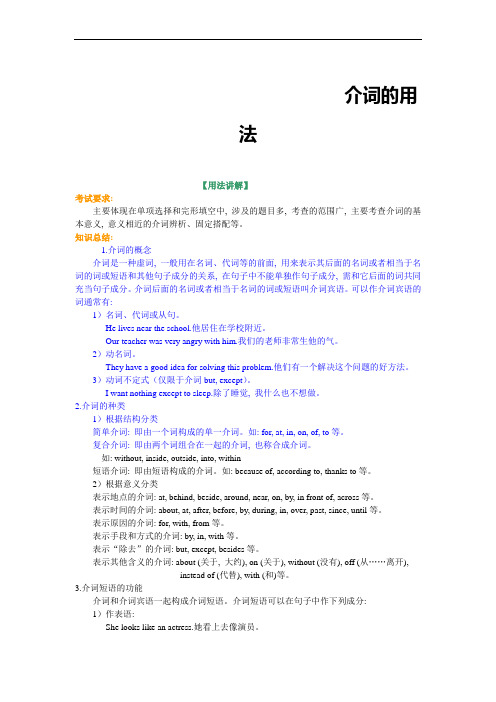
介词的用法【用法讲解】考试要求:主要体现在单项选择和完形填空中, 涉及的题目多, 考查的范围广, 主要考查介词的基本意义, 意义相近的介词辨析、固定搭配等。
知识总结:1.介词的概念介词是一种虚词, 一般用在名词、代词等的前面, 用来表示其后面的名词或者相当于名词的词或短语和其他句子成分的关系, 在句子中不能单独作句子成分, 需和它后面的词共同充当句子成分。
介词后面的名词或者相当于名词的词或短语叫介词宾语。
可以作介词宾语的词通常有:1)名词、代词或从句。
He lives near the school.他居住在学校附近。
Our teacher was very angry with him.我们的老师非常生他的气。
2)动名词。
They have a good idea for solving this problem.他们有一个解决这个问题的好方法。
3)动词不定式(仅限于介词but, except)。
I want nothing except to sleep.除了睡觉, 我什么也不想做。
2.介词的种类1)根据结构分类简单介词: 即由一个词构成的单一介词。
如: for, at, in, on, of, to等。
复合介词: 即由两个词组合在一起的介词, 也称合成介词。
如: without, inside, outside, into, within短语介词: 即由短语构成的介词。
如: because of, according to, thanks to等。
2)根据意义分类表示地点的介词: at, behind, beside, around, near, on, by, in front of, across等。
表示时间的介词: about, at, after, before, by, during, in, over, past, since, until等。
表示原因的介词: for, with, from等。
初中英语语法专题—介词讲解
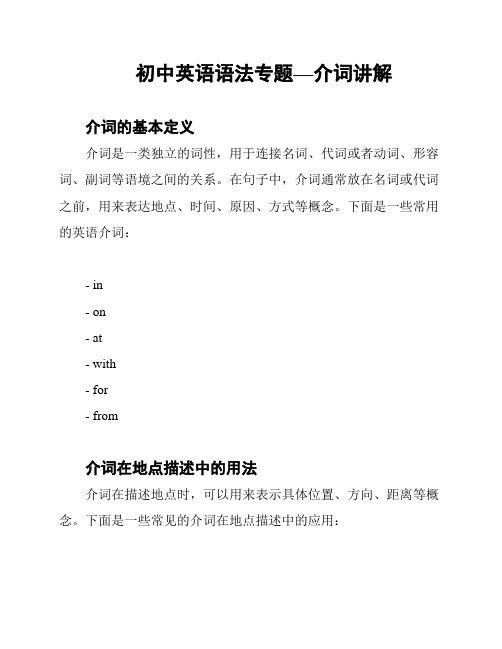
初中英语语法专题—介词讲解介词的基本定义介词是一类独立的词性,用于连接名词、代词或者动词、形容词、副词等语境之间的关系。
在句子中,介词通常放在名词或代词之前,用来表达地点、时间、原因、方式等概念。
下面是一些常用的英语介词:- in- on- at- with- for- from介词在地点描述中的用法介词在描述地点时,可以用来表示具体位置、方向、距离等概念。
下面是一些常见的介词在地点描述中的应用:- in:用于表示在某个范围之内的位置,例如 "in the room"(在房间里),"in the park"(在公园里)。
- on:用于表示在表面、平台或者位置上的状态,例如 "on the table"(在桌子上),"on the bus"(在公交车上)。
- at:用于表示在某个具体位置或者地点,例如 "at the cinema"(在电影院),"at school"(在学校)。
- to:用于表示朝向某个位置的移动,例如 "go to the park"(去公园)。
介词在时间描述中的用法介词在描述时间时,可以用来表示具体时间、时间段等概念。
下面是一些常见的介词在时间描述中的应用:- at:用于表示具体的时间点,例如 "at 7 o'clock"(在7点钟)。
- on:用于表示具体的日期或者星期几,例如 "on Monday"(星期一),"on January 1st"(1月1日)。
- in:用于表示较长的时间段或者某一个时间段内,例如 "inthe morning"(早上),"in July"(在七月)。
介词在原因描述中的用法介词在描述原因时,可以用来表示某事的起因或者原因。
初中英语语法之介词

初中英语语法之介词初中英语语法大全之介词介词(preposition 简写prep.)又称作前置词,表示名词、代词等与句中其他词的关系,在句中不能单独作句子成分。
下面是店铺精心为大家整理的关于介词的初中英语语法知识,希望对大家有帮助!初中英语语法之介词篇1I介词的功能介词是一种虚词,用来表示名词或相当于名词的其它词语句中其它词的关系,不能单独使用。
介词可与名词或相当于名词的其它词构成介词短语。
介词短语可在句中作定语,状语,表语和宾语补足语。
例如:The boy over there is John’s brother. (定语)The girl will be back in two hours. (状语)Our English teacher is from Australia. (表语)Help yourself to some fish. (宾语补足语)II表示时间的介词表示“时间”的介词如下:1.表示年、月、日、时刻等用at,in,on2.表示时间的前后用 before, after3.表示期限等用by,until,till4.表示期间等用for,during,through5.表示时间的起点等用 from, since6.表示时间的经过等用in,within(1) at,on,in1)at:用于表示时刻、时间的某一点at noon正午时 at night在夜间 at present目前at nine(o’clock)在九点钟We usually have lunch at noon(at twelve).我们通常中午吃午饭(十二点吃午饭)。
(2)on:用于某天,某一天的上、下午(指具体的某一天时,一律用on)注意 :泛指一般的上午(下午)时用in,但特指某日的上午(下午)时用on。
in the morning在早上on sun day morning在周日早上on Monday在周一on Tuesday morning在周二早上on June 6在6月6日on May 4,1996在1996年5月4日on a cold night在一个寒冷的夜晚on the night of July(the) first在七月一日的夜晚We didn't listen to the lecture on Wednesday afternoon上周三下午我们没去听演讲。
介词(19张PPT)初中英语专项复习课件

(五)at 与in at与较小的地点连用,in与较大的地点连用。如: He arrived at school at 8 o'clock. 他八点到达学校。 He arrived in Paris yesterday. 他昨天到达巴黎。
(三)be+形容词+介词 be born in…出生于…… be good at…擅长…… be made of…由……制成 be angry with sb.跟某人生气 be angry at sth.为某事生气 be pleased with sb.对某人感到满意 be satisfied with sth.对某事感到满意 be surprised at… 对……感到惊奇(诧异)
They walked through the forest. 他们穿过森林。
(四)in front of与in the front of in front of 表示“在某人或某物的前面”,在某个范围以外; in the front of 表示“在……的前部”,在某个范围以内。如: There are some tall trees in front of the building. 这座楼前面有一些高高的树木。
(二)介词+名词 in time 及时 on time 准时 at home 在家 in English 用英语 at night 在晚上 with a smile 带着微笑 without breakfast 没吃早餐 at first 首先 at last 最后
on one's way to… 在某人去……的路上 at once 立刻,马上 at the same time 同时 by hand 手工,亲手 in trouble 处于困境 in fact 事实上 on duty 值日 on the left/right 在左/右边 to one's surprise 令某人吃惊的是
(完整word版)介词用法归纳,推荐文档
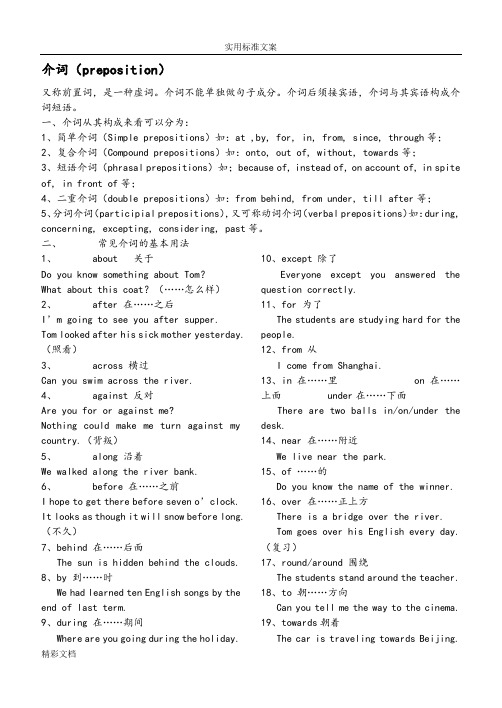
介词(preposition)又称前置词,是一种虚词。
介词不能单独做句子成分。
介词后须接宾语,介词与其宾语构成介词短语。
一、介词从其构成来看可以分为:1、简单介词(Simple prepositions)如:at ,by, for, in, from, since, through等;2、复合介词(Compound prepositions)如:onto, out of, without, towards等;3、短语介词(phrasal prepositions)如;because of, instead of, on account of, in spite of, in front of等;4、二重介词(double prepositions)如:from behind, from under, till after等;5、分词介词(participial prepositions),又可称动词介词(verbal prepositions)如:during, concerning, excepting, considering, past等。
二、常见介词的基本用法1、 about 关于Do you know something about Tom?What about this coat?(……怎么样)2、 after 在……之后I’m going to see you after supper. Tom looked after his sick mother yesterday.(照看)3、 across 横过Can you swim across the river.4、 against 反对Are you for or against me?Nothing could make me turn against my country.(背叛)5、 along 沿着We walked along the river bank.6、 before 在……之前I hope to get there before seven o’clock. It looks as though it will snow before long.(不久)7、behind 在……后面The sun is hidden behind the clouds.8、by 到……时We had learned ten English songs by the end of last term.9、during 在……期间Where are you going during the holiday. 10、except 除了Everyone except you answered the question correctly.11、for 为了The students are studying hard for the people.12、from 从I come from Shanghai.13、in 在……里 on 在……上面 under在……下面There are two balls in/on/under the desk.14、near 在……附近We live near the park.15、of ……的Do you know the name of the winner.16、over 在……正上方There is a bridge over the river.Tom goes over his English every day.(复习)17、round/around 围绕The students stand around the teacher.18、to 朝……方向Can you tell me the way to the cinema.19、towards朝着The car is traveling towards Beijing.20、with 和……一起me?Would you like to go to the cinema with学习这些介词时可以先记住它的汉语意思,然后参照例句来加深理解,并在今后的学习中加以灵活运用。
(完整版)初中英语语法介词用法讲解与练习
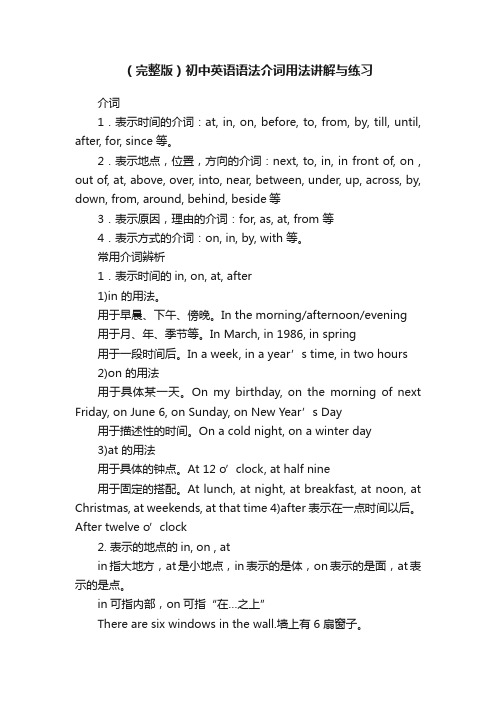
(完整版)初中英语语法介词用法讲解与练习介词1.表示时间的介词:at, in, on, before, to, from, by, till, until, after, for, since 等。
2.表示地点,位置,方向的介词:next, to, in, in front of, on , out of, at, above, over, into, near, between, under, up, across, by, down, from, around, behind, beside等3.表示原因,理由的介词:for, as, at, from 等4.表示方式的介词:on, in, by, with 等。
常用介词辨析1.表示时间的in, on, at, after1)in 的用法。
用于早晨、下午、傍晚。
In the morning/afternoon/evening用于月、年、季节等。
In March, in 1986, in spring用于一段时间后。
In a week, in a year’s time, in two hours2)on 的用法用于具体某一天。
On my birthday, on the morning of next Friday, on June 6, on Sunday, on New Year’s Day用于描述性的时间。
On a cold night, on a winter day3)at 的用法用于具体的钟点。
At 12 o’clock, at half nine用于固定的搭配。
At lunch, at night, at breakfast, at noon, at Christmas, at weekends, at that time 4)after 表示在一点时间以后。
After twelve o’clock2. 表示的地点的in, on , atin指大地方,at是小地点,in表示的是体,on表示的是面,at表示的是点。
初一英语常见介词用法归纳
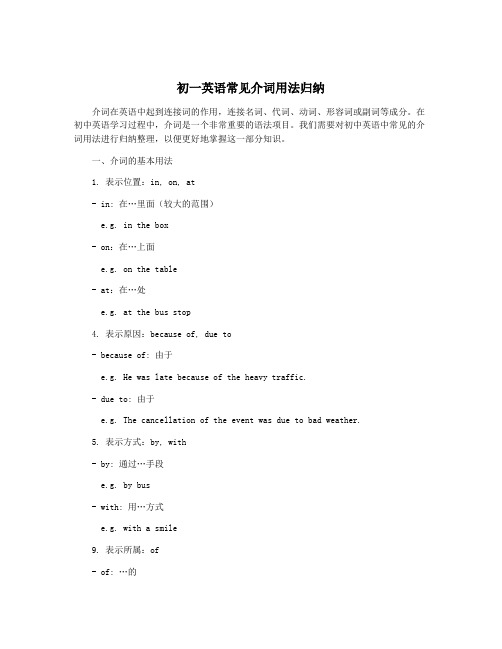
初一英语常见介词用法归纳介词在英语中起到连接词的作用,连接名词、代词、动词、形容词或副词等成分。
在初中英语学习过程中,介词是一个非常重要的语法项目。
我们需要对初中英语中常见的介词用法进行归纳整理,以便更好地掌握这一部分知识。
一、介词的基本用法1. 表示位置:in, on, at- in: 在…里面(较大的范围)e.g. in the box- on:在…上面e.g. on the table- at:在…处e.g. at the bus stop4. 表示原因:because of, due to- because of: 由于e.g. He was late because of the heavy traffic.- due to: 由于e.g. The cancellation of the event was due to bad weather.5. 表示方式:by, with- by: 通过…手段e.g. by bus- with: 用…方式e.g. with a smile9. 表示所属:of- of: …的e.g. the hat of the boy2. look forward to: 期待e.g. I am looking forward to the summer vacation.5. be interested in: 对…感兴趣e.g. Amy is interested in learning Chinese.三、常见介词错误用法及纠正1. 错误用法:depend of正确用法:depend one.g. We depend on each other.通过以上的介词错误用法及纠正,我们可以更清晰地了解该如何正确使用这些介词。
四、综合练习通过上述的综合练习,可以帮助大家更好地掌握介词用法。
初中英语语法复习:介词(中考总复习)

over
经过、跨越。
我们必须越过那座山。
专题五 介 词
返回目录
介词
含义及用法
例句
方
After you go through the gate, you’ll
位
意为“穿过;通过;经过”,
through
see a beautiful garden. 穿过门之后,
指从空间内部通过。
介
你将看到一个美丽的花园。
升
-He came_______Monday.
A.in
B.on
C.to
D.by
专题五 介 词
8.-Please tell me your decision_______tomorrow morning, OK?
拓
-No problem.I will call you tonight.
展
A.before B.during C.through D.since
(台湾是中国的一部分)
专题五 介 词
返回目录
介词
含义及用法
举例
表示“在……(的平面)上”。 on the desk在桌上
(即: )
on the wall在墙上
方
on 表示A地位于B地的外面且接壤 Hunan Province lies on the west of
。 位
(即: )
Jiangxi Province.湖南省在江西省西 边。(湖南省同江西省接壤)
by
the kids playing outside.简站在窗户
位
靠近
旁边,看着外面玩耍的孩子们。
介
There is a football behind the table.
初中英语介词语法知识点总结(讲义及答案)
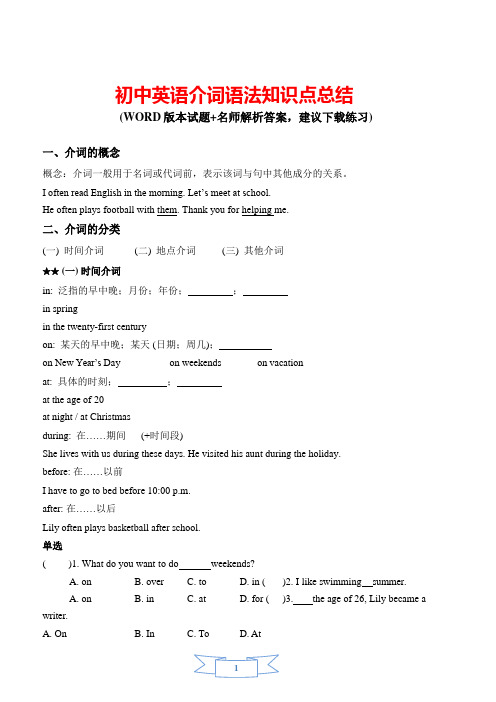
初中英语介词语法知识点总结(WORD版本试题+名师解析答案,建议下载练习)一、介词的概念概念:介词一般用于名词或代词前,表示该词与句中其他成分的关系。
I often read English in the morning. Let’s meet at school.He often plays football with them. Thank you for helping me.二、介词的分类(一) 时间介词(二) 地点介词(三) 其他介词★★ (一) 时间介词in: 泛指的早中晚;月份;年份;;in springin the twenty-first centuryon: 某天的早中晚;某天 (日期;周几);on New Year’s Day on weekends on vacationat: 具体的时刻;;at the age of 20at night / at Christmasduring: 在……期间(+时间段)She lives with us during these days. He visited his aunt during the holiday.before: 在……以前I have to go to bed before 10:00 p.m.after: 在……以后Lily often plays basketball after school.单选( )1. What do you want to do weekends?A. onB. overC. toD. in ( )2. I like swimming summer.A. onB. inC. atD. for ( )3. the age of 26, Lily became a writer.A. OnB. InC. ToD. At( )4. Jim learned to drive ___ the holiday.A. atB. duringC. toD. for( )5. He went to Shanghai July 7, 2013 and came backa cold morning last year.A. in; onB. on; inC. on; onD. in; in( )6. My mom often tells me to go back home dark(黄昏).A. afterB. toC. beforeD. for( )7. A lot of people are here _ vacation every year.A. ofB. onC. atD. with★★ (二) 地点介词1.地点介词 at, in, onat: “在……”(表一个点或小地方)at home at Mr. Cool’s Clothes Storeat the pool at Central Parkin: “在……里” (表一个范围或大地方) in China in Beijing in the water in the parkon: “在……上” (表一个表面,并接触) on the floor on the wall 对比这三个句子:They stood at the door and waited.他们站在门口等着。
初中英语语法——介词(常考)

初中英语语法——介词(常考)考点1 时间介词①in,after,later表示时间的区别in +时间段,用于将来时,表示“过……后”。
He will come back in an hour.after+一段时间,用于过去时,表示“在……以后”。
After an hour,he came back.after+时间点,用于将来时,表示“在……以后”。
He will come back after 5 o'clock.时间段+later,常用于过去时,表示“在……之后”。
An hour later,he came back.②in,on,at表示时间的区别in 主要表达年、月、季节、年代、世纪;泛指上午、下午、晚上。
➢in spring在春天in February在二月in the 21st century在21世纪➢We have four lessons in the morning. 我们上午有四节课。
on 主要表示星期、日期或具体的某一天;特指具体某一天的上午、下午、晚上用on。
➢on Monday在星期一on May 1st在五月一号on Labor Day在劳动节➢We have two lessons on Friday afternoon. 我们周五下午有两节课。
at 表示某一时刻,用于具体时间点前,或正午和午夜前。
➢at 7:00在七点at noon 在正午at night在晚上/在午夜➢We start classes at eight o’clock every morning. (注意every, this, last, next前不加介词)我们每天早上八点上课。
③for,since 表示时间的区别(现在完成时的标志词)for +时间段➢I have lived here for 10 years. 我已经住在这里十年了。
since +时间点/ago短语/一般过去时的从句➢I have lived here since 2013.自从2013年我就住在这里。
(完整版)初中介词和介词短语专题讲解(含练习)
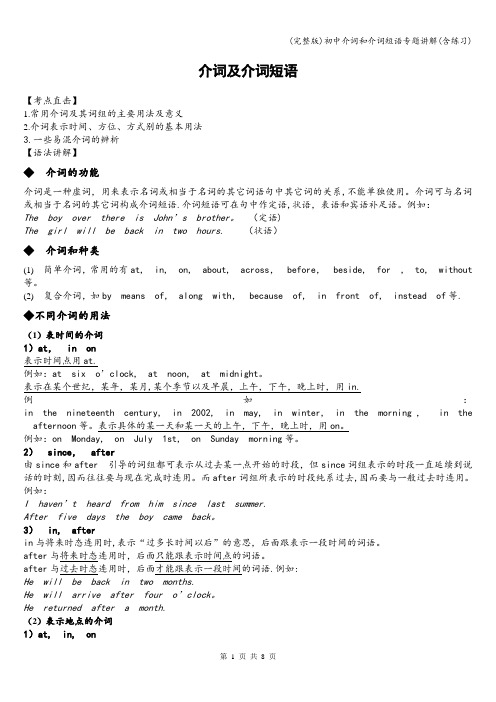
介词及介词短语【考点直击】1.常用介词及其词组的主要用法及意义2.介词表示时间、方位、方式别的基本用法3.一些易混介词的辨析【语法讲解】◆介词的功能介词是一种虚词,用来表示名词或相当于名词的其它词语句中其它词的关系,不能单独使用。
介词可与名词或相当于名词的其它词构成介词短语.介词短语可在句中作定语,状语,表语和宾语补足语。
例如:The boy over there is John’s brother。
(定语)The girl will be back in two hours. (状语)◆介词和种类(1)简单介词,常用的有at, in, on, about, across,before,beside, for , to, without 等。
(2)复合介词,如by means of, along with,because of, in front of, instead of等.◆不同介词的用法(1)表时间的介词1)at,in on表示时间点用at.例如:at six o’clock, at noon, at midnight。
表示在某个世纪,某年,某月,某个季节以及早晨,上午,下午,晚上时,用in.例如:in the nineteenth century, in 2002, in may, in winter, in the morning,in the afternoon等。
表示具体的某一天和某一天的上午,下午,晚上时,用on。
例如:on Monday, on July 1st, on Sunday morning等。
2)since,after由since和after 引导的词组都可表示从过去某一点开始的时段,但since词组表示的时段一直延续到说话的时刻,因而往往要与现在完成时连用。
而after词组所表示的时段纯系过去,因而要与一般过去时连用。
例如:I haven’t heard from him since last summer.After five days the boy came back。
初中英语语法复习之介词讲解-(共50张PPT)
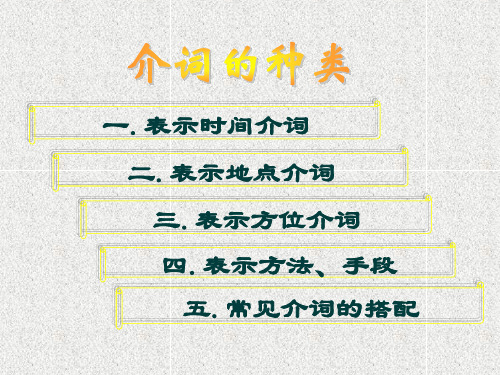
8.in a read coat, the girl in yellow, the boy in white…
3. in English , in French , in your own words, in three language… ____使_用_语__言_用__介_词__in_______
4. in a loud voice, in a low voice… ___使__用_声_音__用_介_词__i_n_____
A. on, over B.above, on C.over, on 5.The sun rose ___the horizon(地平线).
A. on B. above C.over 注意: on 接触平面
over 在平面的正上方 above 在上方
3. in + 大地方 at + 小地 方 on +门牌,某层楼
in space…
____表__示__大__地__方__用__i_n______
❖ 3. in the box, on the chair, under the desk, next to Kate, on the right of Lucy, in front of the house, behind the door…
介词:通常用在____代_词____、___名_词___、__动_名__词__
之前,表示某个人、事物/东西、事件与 另一个之间的___关__系____。
初中英语语法介词知识点汇总

介词介词是一种虚词,不能独立充当句子成分,需与动词、形容词和名词搭配,才能在句子中充当成分。
介词是用于名词或代词之前,表示词与词之间关系的词类,介词常与动词、形容词和名词搭配表示不同意义。
介词短语中介词后接名词、代词或可以替代名词的词(如:动名词v-ing).介词后的代词永远为宾格形式。
一、表示时间的介词(一)表示时间段的介词(1)in , afterin +时间段,表示从现在起往后推算一段时间after +时间段,表示过去某时间往后推算一段时间,如:He’ll come back in two days. 但点钟用after( after three o’clock)He left on July 2 and returned after three days.(2)in , during表示在一段特指的时间内,可用in 或duringThe work was done in / during the holidays.表示年份、月份、季节用in , 如:in 1999 ,in June , in winter(3)in last, for the past + 时间段, during表示在最近一段时间内,句中谓语动词常用现在完成时I have been in Shanghai in the last few years.(4)for 表示延续一段时间。
I’ll study in the U.S for two yearsI’ve waited for Bingo for half an hour.(二)表示某一时间的介词(1)at, onat 表示某一时刻,on 表示某一天或日期, 如:at 7:14, on Saturday morning on the night of May2一天内各段时间表达, 选用正确的介词,请比较:in the morningon a winter / snow / cold / morningat nighton the night of March 7thin the eveningon Friday evening(2)before, bybefore 表示某一时间之前,而by 表示到某一时间止,句中谓语动词多用完成时态。
(word完整版)初中英语介词用法全

初中阶段介词用法汇编※一、表示时间的介词:1、at、on、in“at时间点,有on必有天,in指月季年,也和色相连”就是说,有具体的时间点的时候用at,具体那一天用on,说到月份,季节,年份,就用in ;而且说谁穿了什么颜色的衣服的时候,也是用in XX(color)】at用于某一具体时刻或重大节日之前①在五点钟______②在中午________③在夜晚________④在圣诞节________⑤在午夜_________【答案】①at five o’clock ②at noon ③at night ④at Christmas ⑤at midnight(2)on用在具体某一天或某天的上午、下午、晚上之前①在国庆节_________②在周二晚上_________③在星期天_________【答案】①on National Day ②on Tuesday evening ③on Sunday(3)in用在周、日、季节或泛指的上午、下午、晚上前①在一周内_________②在五月_________③在夏季_________④在2009年_________⑤在下午_________ 【答案】①in a week ②in may ③in summer ④in 2009 ⑤in the afternoon归纳总结在初中阶段常见的固定短语in English用英语 in a minute一会儿、立刻 in a short while一会儿、不久in a hurry匆匆忙忙 in danger在危险中 in full全部地、详细地in a word一句话 in all总共 in every case不管怎样in the end最后 in spite of尽管 in person亲自in fact事实上 in good health身体健康的 in front of在……前面in some ways在某些方面 in common共同的 in public当众☆考题再现:---Who was the first man with A(h1n1) flu in mainland China know for sure?---________May 11,2009.A InB OnC ForD Since【答案】B 【解析】在具体的某一天用on2、before、afterbefore表示“在某时刻或某件事之前”,after用在时刻或某件事之后。
初中英语语法—介词(26张)PPT课件
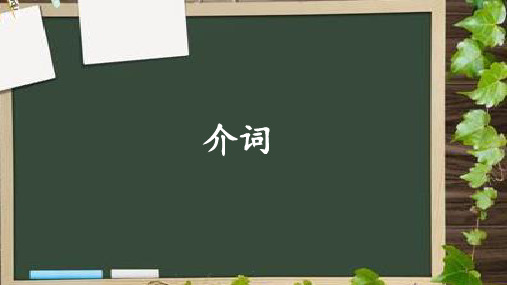
-
1
介词的分类方时 地式间 点介介 介词词 词
介词介词短语b动介e+词词形++容介名词词词+介词
介词的功能定 表语 语
状语 宾语
-
2
1.表时间时,at强调“点”,in强调“段”,on强调“日”和某日的早、中、晚。 I got there at eight this morning. 今天早上我八点到那。
-
5
The teacher had already started teaching by the time she got to class. 当她到班级的时候老师已经开始讲课了。 6.表地点时,in表示“范围较大的地方”,强调“空间”;at表示在“范 围较小的地方”,强调“点”。 I live in China. 我居住在中国。 We often wait for the bus at the bus stop. 我们通常在公共汽车站等车。 7.表位置时,in表示“在……内”,on表示“在……上”(接触表面), on还可以表示“在两边”“在左/右边”。
-
8
The sunshine got into the room through the glass. 阳光透过玻璃进入房间。 11.behind表示“在……的后面”,其反义词组“in front of”表示“ 在……的前面”,注意与in the front of 的区别。 We must keep our hands behind our backs. 我们必须一直把手放在背后。 I was walking down the street when a friend of mine stood in front of me. 当一个朋友站在我面前时,我正沿着街道散步。
初中英语语法---介词专题(含练习)
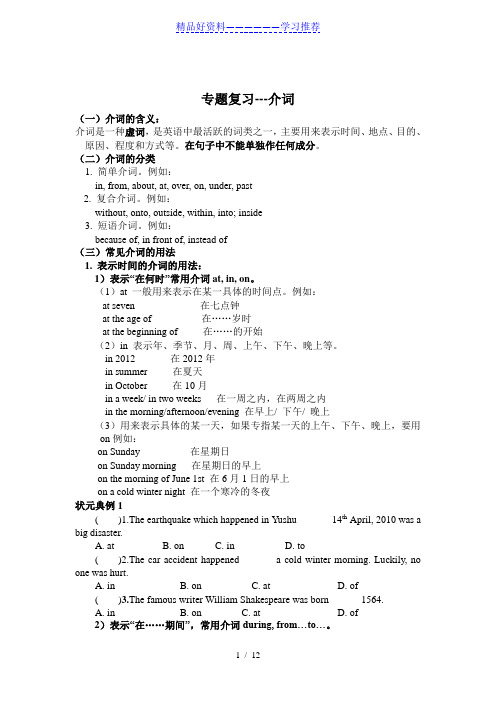
专题复习---介词(一)介词的含义:介词是一种虚词,是英语中最活跃的词类之一,主要用来表示时间、地点、目的、原因、程度和方式等。
在句子中不能单独作任何成分。
(二)介词的分类1. 简单介词。
例如:in, from, about, at, over, on, under, past2. 复合介词。
例如:without, onto, outside, within, into; inside3. 短语介词。
例如:because of, in front of, instead of(三)常见介词的用法1. 表示时间的介词的用法:1)表示“在何时”常用介词at, in, on。
(1)at 一般用来表示在某一具体的时间点。
例如:at seven 在七点钟at the age of 在……岁时at the beginning of 在……的开始(2)in 表示年、季节、月、周、上午、下午、晚上等。
in 2012 在2012年in summer 在夏天in October 在10月in a week/ in two weeks 在一周之内,在两周之内in the morning/afternoon/evening 在早上/ 下午/ 晚上(3)用来表示具体的某一天,如果专指某一天的上午、下午、晚上,要用on例如:on Sunday 在星期日on Sunday morning 在星期日的早上on the morning of June 1st 在6月1日的早上on a cold winter night 在一个寒冷的冬夜状元典例1( )1.The earthquake which happened in Yushu ______ 14th April, 2010 was a big disaster.A. atB. onC. inD. to( )2.The car accident happened ______ a cold winter morning. Luckily, no one was hurt.A. inB. onC. atD. of( )3.The famous writer William Shakespeare was born ______1564.A. inB. onC. atD. of2)表示“在……期间”,常用介词during, from…to…。
初中语法--介词

一、什么是介词介词是一种虚词,一般在句子中不重读,也不能单独充当句子成分,但与它的介词宾语一起构成介词短语,就可以在句子中作状语、定语和表语。
介词又称前置词,一般位于名词或代词的前面,表示该词与句子其他成分的关系。
在学习介词时,最重要的是掌握介词的用法,动介词组的搭配,时间介词、方位介词、方向介词、位置介词、成语介词以及动向介词和静向介词的比较和区别。
二、介词的定义及句法功能介词是一种虚词,在句中不单独作任何句子成分,只表示其后的名词或相当于名词的词语与其他句子成分的关系。
介词后的名词,或相当于名词的其他词组、短语或从句,称为介词宾语。
介词和介词宾语一起构成介词短语。
介词短语在句中主要用作定语、状语、表语和宾语补足语。
The boy over there is my brother.(作定语)A friend in need is a friend indeed.(作定语)I shall meet you at the entrance of Qianmen Hotel.(作地点状语)To their surprise, they saw not locusts, but seagulls.(作原因状语)I’ll be in the office every afternoon.(作表语)He isn’t at home(作表语)The farmer made the king out of the water.(作宾语补足语)I found everything in good order(作宾语补足语)三、介词与其他词类的固定搭配。
介词和动词、形容词、名词等常构成固定搭配。
也就是说,在这些词的后面,常常要求用一定的介词。
1、形容词与介词的固定搭配有些形容词后面要求用固定的介词,这类介词常见的有:about, at, for, from, in, of, to, with(1)形容词+aboutcareful about hopeful about sure aboutHe is careless about his clothes(2)形容词+at(3)形容词+ forfamous for ready for sorry forI’m terrible sorry for telling him the truth.(4)形容词+ fromdifferent from safe fromHe was absent from class this morningMy sister is different from me in many ways.(5)形容词+ ininterested in successful inHe is interested in making model ships.2、名词与介词的固定搭配(1)名词+ forHe made up an excuse for being late.Did you find the cause for your failure?(2)名词+ inHe has some difficulty in translating the bookShe has made great progress in English.(3)名词+ ofShe found another way of solving the problemHe forms a bad habit of getting up late(4)名词+ onThere have been several attacks on foreigners recently. Have pity on me!(5)名词+ withI wanted to have a talk with youHe is always getting into trouble with the police。
- 1、下载文档前请自行甄别文档内容的完整性,平台不提供额外的编辑、内容补充、找答案等附加服务。
- 2、"仅部分预览"的文档,不可在线预览部分如存在完整性等问题,可反馈申请退款(可完整预览的文档不适用该条件!)。
- 3、如文档侵犯您的权益,请联系客服反馈,我们会尽快为您处理(人工客服工作时间:9:00-18:30)。
介词考点知识测验1.There is a post office ________ the other side ________ the street.2.Sam was angry ________ them and he left _________ telling anybody.3.Work had and you’ll catch up _________ others.4.We can surf much information ________ the Internet.5.They often learn English _______ each other.6.The poor old man died ________ the evening of October 10.7.The little girl ________ red looked beautiful.8.Do you know the key ________ success?9.They walked along the river _______ another ten minutes.10.I usually spend three hours ________ doing my homework.11.Look! They’re waiting ______ the bus ______ the bus-stop.12.---How do you go to work every day?---______ underground.13.I think the dictionary is quite useful ______ you.14.She began to play the piano _______ the age ______ five.15.How much did you pay ______ your new dress?一、【考点分析】一、介词短语的形式:介词是一种虚词,不能独立存在。
它必须和随后的补足成分(又称“介词宾语”)一起构成介词短语,才能用于句中。
介词宾语可以是名词、代词、数词、动名词、wh-短语、从句等。
现分别举例如下:⑴介词+名词,例如:(go) by bus 乘公共汽车(去)(play) in the park 在公园里(玩)(come) on Sunday 星期天(来)⑵介词+代词,例如:(talk) to oneself 对自己(说),自言自语(a letter) for you 给你的(信)(not…) at all 一点也(不)⑶介词+数词,例如:(cut sth) in two (把……切)成两半⑷介词+动名词,例如:(a way) of doing that 做那件事的(方式)be good at drawing pictures善于画画⑸介词+wh-短语,例如:(talk) about what to do next(谈论)下一步该做什么⑹介词+从句,例如:Please think of what I said. 请你考虑我说的话。
二、介词短语的基本用法:⑴介词短语用作表语,例如:The post office is just across the street.She looks so much like her mother.⑵介词短语用作宾语补足语,例如:I was surprised to find him on the bus.Please make yourself at home.⑶介词短语用作后置定语,例如:The girl in the hat is my sister.Do you like the jacket on the left?Did you see the house with many trees around it?⑷介词短语用作状语,例如:What are you going to do on Christmas?A policeman is standing next to him.By the way, what time is it now?Miss Zhao came in with a big smile on her face.二、常考点清单一、初中英语常用介词短语1.at once 立刻2.at last 最后3.at first 起先,首先4.at the age of... 在……岁时5.at the end of... 在……之末6.at the beginning of..在……之初7.at the foot of... 在……脚下8.at the same time 同时9.at night/noon 在夜里/中午10. with one's help 在某人的帮助下,由于某人的帮助11. with the help of...在……的帮助下12. with a smile 面带笑容13. with one's own eyes 亲眼看见14. after a while 过了一会儿15. from now on 从现在起16. from then on 从那时起17. for example 例如18. far away from 远离19. from morning till night 从早到晚20. by and by 不久21. by air mail寄航空邮件22. by bike/air/train/bus骑自行车/乘飞机/火车/公共汽车23. by ordinary mail寄平信24. by the way顺便说25. by the window在窗边26. by the end of...到……底为止27. little by little逐渐地28. in all总共29. in fact事实上30. in one's twenties在某人二十几岁时31.in a hurry匆忙32.in the middle of在……中间33. in no time( in a minute)立刻,很快34. in time( on time)及时35. in public公众,公开地36. in order to为了….37. in( the) front of在……前面38. in the sun在阳光下39. in the end最后,终于40. in surprise惊奇地41. in turn依次42. of course当然43.a bit( of)有一点儿44.a lot of许多45.a little -点儿46. on one's way to某人在去……的路上47. on foot步行,走路48.a talk on space关于太空的报告49. on the other hand另一方面50. at/on the weekend在周末51.on the left( right)在左(右)边52. on the other side of在……另一边53. on the radio通过收音机(无线电广播)54. to one's joy使……高兴的是55.to one's surprise使……惊讶的是二、常用介词的基本用法易错点:1.表示地点的介词in,on和to的用法in表示在某一地区之内的某方位(属于该范围);to表示在某一地区之外的某方位(不属于该范围);on表示与某地的毗邻关系。
Taiwan is in the southeast of China. 台湾位于中国的东南部。
(范围之内)Japan is to the east of China. 日本在中国的东边。
(范围之外,不接壤)Korea is on the east of China. 朝鲜毗邻中国的东边。
(毗邻)2.be made / used之后介词的选择(1) be made常见结构①be made in在某地制造My mother likes to buy things which are made in China.②be made of和be made from都可以表示“由……制成”,但be made of强调从品上能看出原材料,而be made from则表示从成品上看不出原材料。
The desk is made of wood.这张桌子是由木头制成的。
This paper is made from wood.这种纸是由树木制成的。
③be made into被制成……This piece of wood will be made into a small bench.这块木头将要被制成一个小凳。
④be made up of由……组成The group is made up of five students. 这一组由五个学生组成。
(2) be used常见结构①be used to= become used to习惯于(做)=get used to...,后接名词、代词或动名词形式。
He is used to getting up early.他习惯于早起。
②be used to被用来(做)……,后接动词原形。
A pan is used to cook.锅是用来炒菜的。
③be used for意义相当于be used to do,但for后接动名词形式。
A pan is used for cooking. 锅是用来炒菜的。
④be used as被当作……来使用。
A dictionary is used as a tool for study. 词典是被用来作为学习的工具。
⑤be used by被……使用。
My car was used by my friend yesterday. 我的车昨天由我朋友使用。
⑥used to过去常常做,而现在已经不做,后接动词原形。
He used to go to see a film on Friday evening.他以前总是星期五晚上去看电影。
(意思是现在就不是这样了。
)四、易错点清单一、容易误用的介词1.in和on的区别on the tree表示枝、叶、果实等长“在树上”。
There are some apples on the tree.树上有些苹果。
in the tree表示人或其他东西“在树上”。
There are some monkeys in the tree.树上有些猴子。
on the wall表示东西粘贴或挂“在墙上”。
